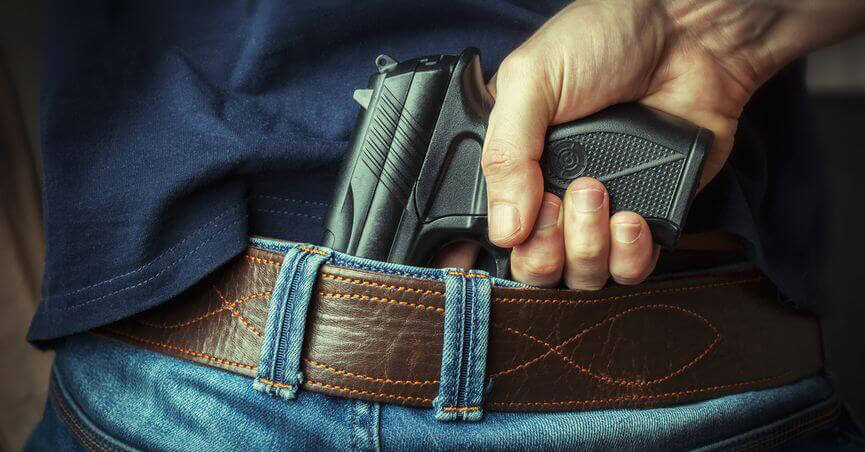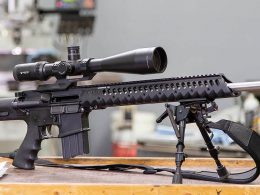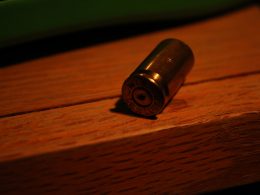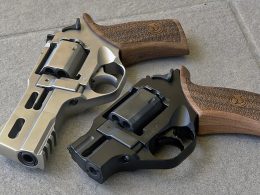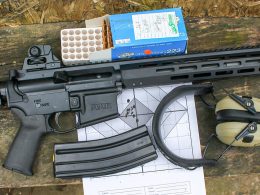The AR-15 platform is the first thing that springs to mind when you think about building a rifle. This firearm is a durable, adaptable, and highly configurable option for law enforcement and the general public alike.
There are only three other firearms in the world that come close to rivaling the AR-15 in customizations and sales. They are the Glock series, 1911s, and Ruger 10/22 rifles. However, what sets the AR-15 apart is how accessible each individual piece is. It allows you to customize your rifle down to the nuts and bolts.
This versatility in parts and accessories also means that you can construct the AR-15 to host various different calibers from the 5.56 NATO to the supersonic .300 AAC Blackout and 6.8mm Remington SPC.
So, if you’re looking to build an AR-15 chambered in 6.8 SPC or ways to chamber the 6.8 SPC on your current AR build, the barrel is one of the key components you need to upgrade.
But don’t let that intimidate you. If you’re a beginner or a casual firearm enthusiast, we’ve got everything you need to know before purchasing a 6.8 SPC upper receiver. If you’ve already got an idea of what you’re looking for, feel free to skip to our buyer’s guide or head to our list of the best 6.8 SPC uppers.

|
PSA 18-Inch Mid-Length 6.8 SPC II 1/11 Stainless Steel 15-Inch Lightweight M-Lok Upper with BCG&CH |
|
$0
 Shop NowClick to read my review
Shop NowClick to read my review |

|
Aero Precision AR-15 Stripped Upper Receiver |
|
$81
 Shop NowClick to read my review
Shop NowClick to read my review |
| Bravo Company AR-15/ M4 Flattop Upper Receiver Assembly |
|
$120
 Shop NowClick to read my review
Shop NowClick to read my review |
BONUS OFFER: Get your free shooting range targets to print at home!
Get your free targets to print at home!
The 6.8mm Remington SPC
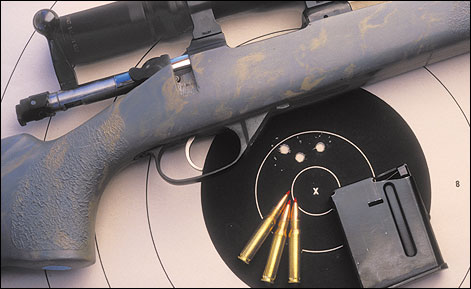
The 6.8 Special Purpose Cartridge (SPC), sometimes known as the 6.8 Remington, is a centerfire rifle cartridge that fires a 7mm bullet. It has identical cartridge specifications to the 5.56 NATO. After decades of service by US special forces, it was created as a replacement for the 5.56 NATO and.223 rounds.
Even though the 6.8 SPC has better ballistics than other comparable cartridges, it has never displaced the 5.56. It has increased energy, stopping force, precision, and effective range. You can achieve sub-MOA groups with the 6.8 SPC and a high-quality 6.8 SPC barrel.
Its ballistics are on par with the numerous 6.5mm and 7mm rounds now on the market. Yet, it only takes about the same amount of storage space as a standard 5.56 Cartridge. As a result, if you want to use the 6.8 SPC, you don’t need to upgrade to a larger .308 caliber AR-10 rifle.
Because of their similar size, you can fire both the 5.56 and 6.8 SPC rounds in the same magazines. Also, you can use most of the same lower and upper component kits as the 5.56 cartridge. As a result, you should only need to change a minimal number of additional components on your AR-15 upper receiver to load up the 6.8 SPC, assuming the barrel is the main source of concern.
What are Upper Receivers?
The upper receiver is the component of an AR-15 that holds the barrel, forend, bolt carrier group, charging handle, and any other AR accessories you’d like to include in your build, such as scopes and lights. The upper receiver, which connects the lower receiver to the rifle, allows you to personalize the firearm’s appearance and functionality.
Why Upgrade Your AR-15 Upper?
Upgrading your upper receiver has a lot of benefits. For starters, if you’re looking to start shooting the 6.8 SPC, you’re going to need a new barrel anyway. So it is the perfect time to swap out the entire upper receiver for something that would be able to handle a more powerful round than the 5.56. So you may want to go with an upper receiver that utilizes more durable materials. Upgrading the entire upper receiver also means less compatibility issues vs upgrading individual parts separately, like the barrel, and hoping it works with your current upper receiver.
Parts of an Upper Receiver
Barrel
The barrel is one of the most crucial parts as this is where the bullet exits and accelerates. This means that this part of your upper receiver has to deal with a lot of heat, friction, gas and force. There are a variety of barrel lengths available for the AR-15. But in general, the longer the barrel, the better the range and accuracy. Look for a barrel with chrome rifling and at least a 1:8 twist ratio. And for legal reasons, at least 16″ in length.
Bolt Carrier Group
The AR-15 bolt carrier group (BCG) is the heart (or engine) of your rifle and the key component responsible for making your rifle work in the first place. It consists of the gas key, bolt, extractor, and firing pin. Also, it contains the other supporting pieces and rests in the inside of the upper receiver. All these components work together to make sure bullets are fired correctly, spent cartridges are ejected out, and new cartridges stripped from the magazine and fed to the chamber. Hence, completing and repeating the cycle after every shot. This is the mechanism responsible for semi-auto and automatic fire rifles. Â
Gas Block and Gas Tube
To get your projectile out of the barrel and toward its intended target, you need gas pressure. When you fire a cartridge, some of the expanding gas from the burnt powder leaves the barrel through the gas port. Then, it goes down the gas block and into the gas tube where it exits the BCG’s gas key. The pressure created in the gas chamber of the BCG is used as the driving force. Consequently, cycling the BCG and completing the rifle’s action.
Charging Handle
I’ll be pressed if you find an AR-15 without a charging handle. The charging handle is what’s responsible for the initial cycle of your BCG. Think of it like the starter for a car. You pull back the charging handle to release a cartridge from the magazine. Then, load it in the chamber and “charge” your firing pin. As the BCG cycles, the charging handle remains static and it only moves when you move it.
Forward Assist
AR aficionados are divided on the issue of whether or not it is necessary to have a forward assist. Located on the upper receiver, the forward assist is a relatively new AR-15 component. Its primary purpose is to aid your bolt in closing all the way if it is unable to do so.
Handguard and Rail System
Firing an AR-15 at a high rate of speed will quickly heat up the barrel of the weapon. To keep your hands from overheating, rail systems and handguards have been developed to make shooting more pleasant. You can attach AR attachments like scopes, sights, spotlights, and lasers to rail systems. Handguards shield the barrel from heat and provide a better grip.
Ejection Port Cover
An ejection port cover’s primary function is to keep your weapon free of dirt and debris. When not in use, it serves to protect your bolt carrier group and upper receiver by covering the ejection port. When you press the start button, it will open by itself. Maintenance and upkeep, such as cleaning your AR-15 after shooting, are necessary to guarantee maximum performance.
Uppers According to Construction
Uppers can come in a variety of materials. Some lightweight uppers made from a mix of polymer and metal have started coming out, but most gun owners still prefer aluminum.
Forged Upper Receivers
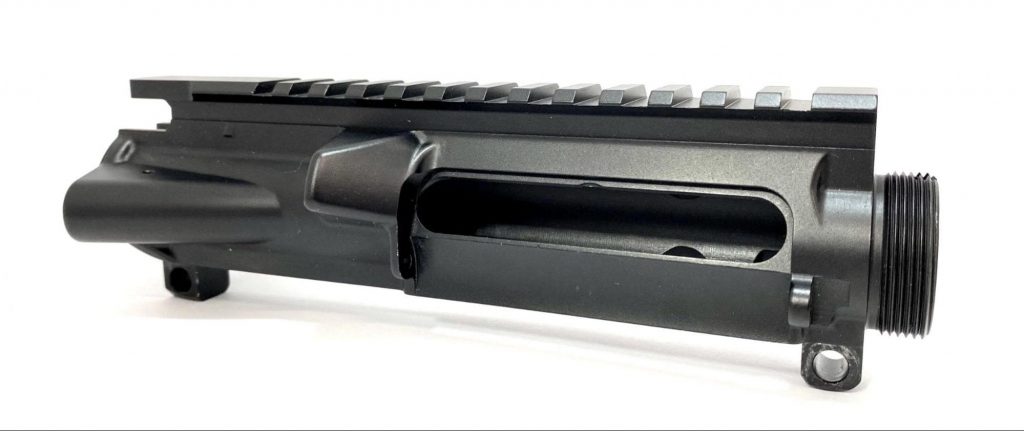
Forged metal uppers give the optimal grain structure or orientation of the firearms. It creates the best balance of mechanical attributes including hardness, fatigue limit, specific weight and others. But they are denser and heavier.
Popular Articles
Billet Upper Receivers
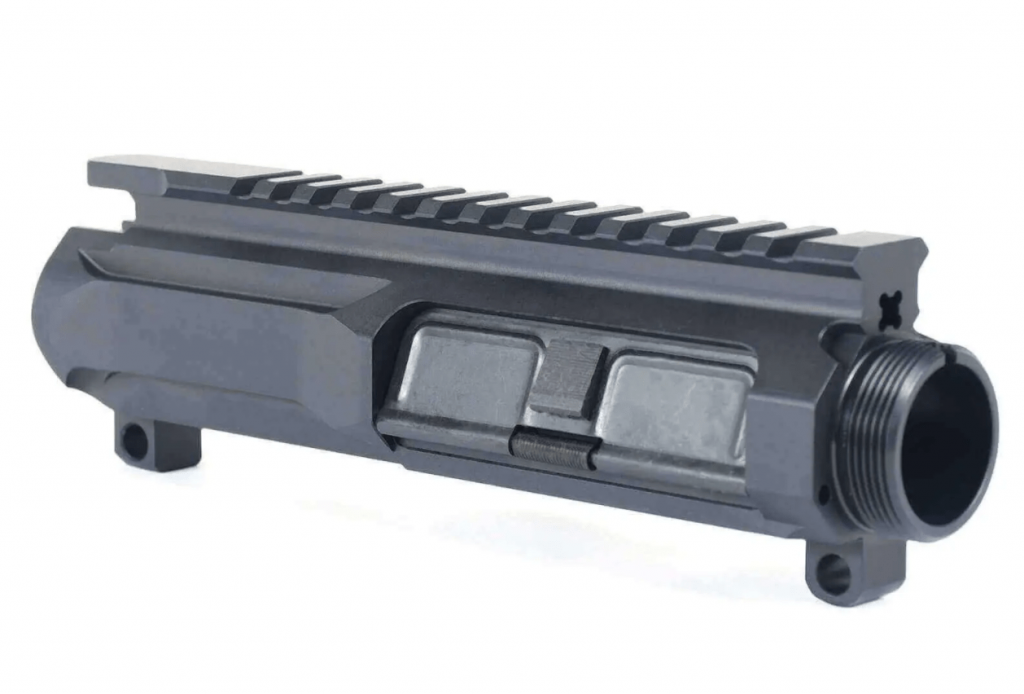
The mechanical qualities of billet metal are comparable to those of forged upper receivers. However, they’re usually less dense and lighter at the cost of losing some material strength. So, this is a trade off you have to think about when shooting heavy grain cartridges.
Cast Upper Receivers
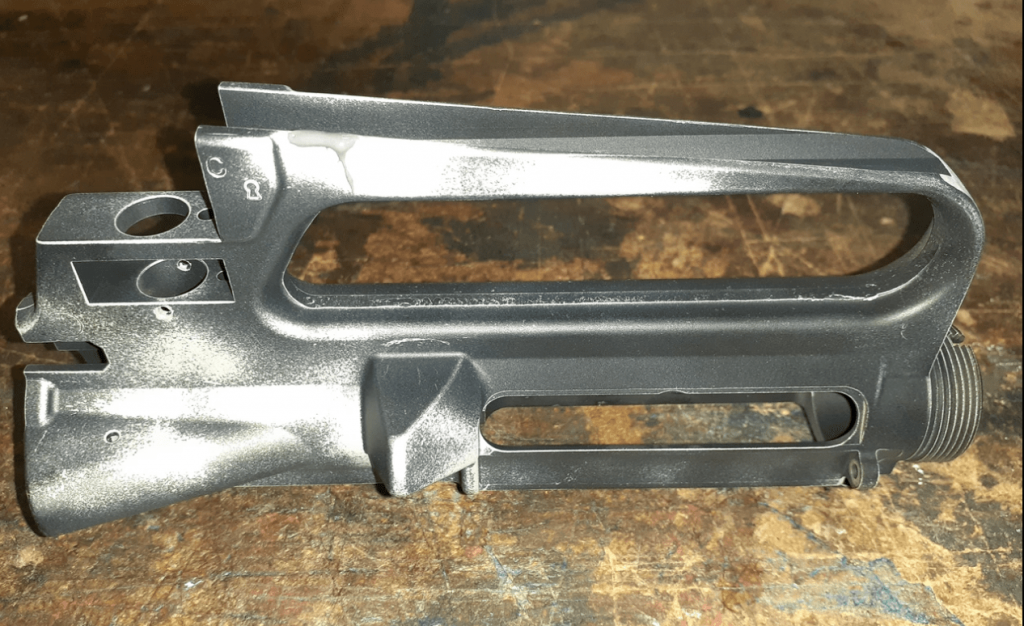
In terms of strength-to-weight ratio, cast metal is the worst option. However, if you’re just looking for a lightweight upper receiver, a cast upper receiver is ideal. Cast uppers are created by die casting, a process where liquid molten metal is poured into a mold. Cast uppers usually come out rough and are finished off with a CNC Mill.
Complete or Stripped Upper Receiver?
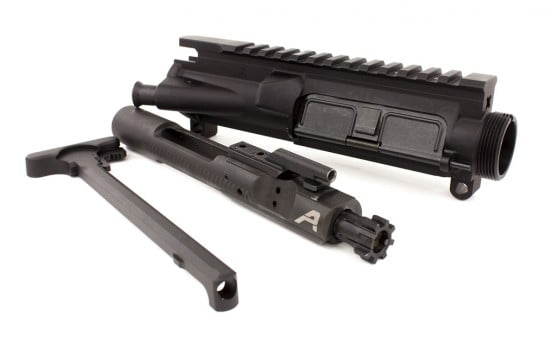
A complete upper receiver comes with almost everything you need to merge with a lower receiver and complete a working firearm. The most basic complete upper receivers include an ejection port food, forward assist button, and charging handle. While some of the more high-end, completed upper assemblies will include everything from the barrel, rails, handguard, BCG, and even some accessories like forends, muzzle attachments, and sights.
A stripped upper receiver, on the other hand, is the piece of metal to which everything is attached. The great thing about a complete upper receiver is that it will come with almost everything you need.
All you have to do is merge it with a lower receiver and you’d technically have yourself a working firearm. This will save you both time and cost and solves a lot of compatibility issues you’d run into by buying each part separately. And even if you do end up swapping out and upgrading parts of the upper receiver, you still have extra parts to work with later on a newer gun build or just in case you need to replace parts for maintenance.
However, one thing that is lacking with a complete upper receiver is customization. If you have a specific build in mind, complete uppers might be a waste of time and money for you. You’ve probably already come to terms with spending a little more for getting the rifle you’d really want. And this is where stripped upper receivers shine. It gives you the versatility to customize and personalize your rifle build to meet your vision for your firearm.
The only issue is you might run into some compatibility issues with some of your parts. But the AR-15 is a great platform to build with since it has a lot fewer compatibility issues than with an AR-10.Â
Flat-Top vs Carry Handle
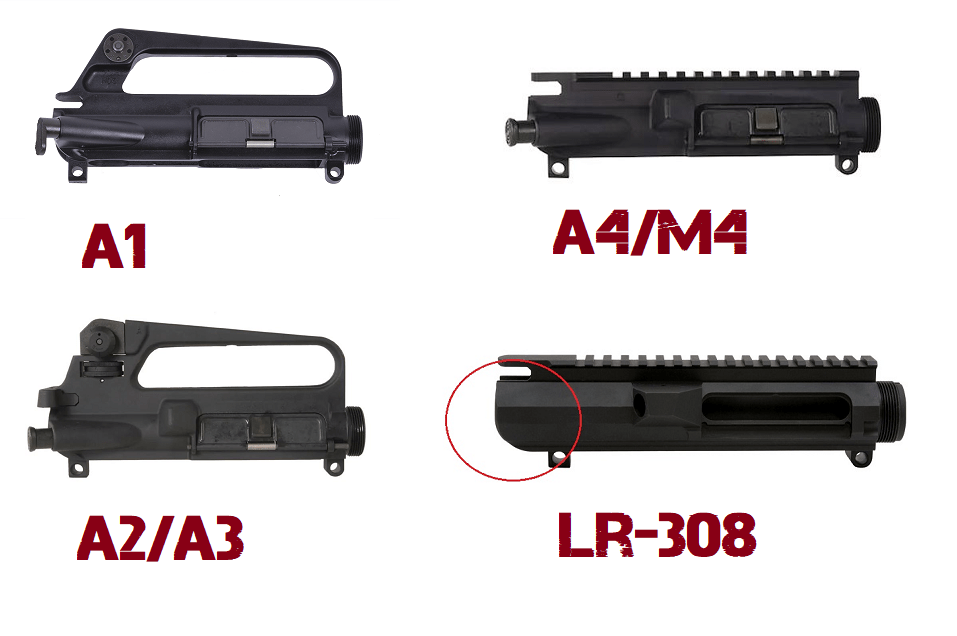
You also typically hear about ARs with A1, A2, A3, and A4 upper carry configurations. To keep things short, they either have a Flat-top or a carry handle on top of the rifle’s upper receiver.
A flat-top AR-15 upper is an AR-15 with a standard Picatinny rail where the sights are usually mounted. In contrast, a carry handle upper will have a fixed carry handle on top of the upper which will act as the rear sight assembly for your firearm. While both of them exist out on the market. If you’re looking for real versatility, you should go with a flat top upper receiver. Because if you really want a carry handle, you can always add one to a Picatinny rail.
Buyer’s Guide for Upper Receivers
Types of Upper Receiver
First, think very carefully about the type of upper receiver that you need for your build. The safest option, especially if you’re a beginner, will always be some variation of a complete upper receiver. Complete uppers can save you time and money and will work well for most scenarios.
Also if you’re looking to shoot a lot of rounds out of your rifle, look for forged o billeted upper receivers. Forged and Billet constructions will give you upper receivers guaranteed to handle the 6.8 SPC better than cast upper receivers.
BONUS OFFER: Get your free shooting range targets to print at home!
Get your free targets to print at home!
Build Quality
Investing in a high-quality upper receiver for your AR-15 is essential if you want your rifle to endure firing bullets for many years. For upper receivers, 7075 aluminum combined with a hard coat anodized finish is generally referred to as the gold standard. Aluminum is both sturdy and light, while anodized coatings are very rust and corrosion resistant, guaranteeing long-term endurance.
Although you can find lightweight polymer upper receivers for your AR-15, I generally don’t recommend using these especially when firing larger and more powerful rounds like the 6.8 SPC or the .300 Blackout. Heavier upper receivers will give you better stability and handle these more powerful rounds better than lighter materials, and polymer uppers will eventually give out from firing these large rounds. If you do insist on using polymer, look for ones with aluminum inserts at critical junction points to at least give you some better durability.
Manufacturer
Choose a receiver from a well-known, reliable brand with a loyal following of customers who are confident in the quality of their products. You can find out more about a product by reading reviews. With any firearm, you want to be confident with the parts you’re using. The last thing you want is your AR-15 falling apart during a self-defense scenario.
Also, by choosing one manufacturer, you’re almost guaranteed to have zero compatibility issues across the board. The same manufacturer will use the same specifications for their AR-15 build kits.
Best 6.8 SPC Upper Receivers for 2022
PSA 18-Inch Mid-Length 6.8 SPC II 1/11 Stainless Steel 15-Inch Lightweight M-Lok Upper with BCG&CH

Those looking for an all-around great pick and beginner-friendly upper receiver should consider the PSA Mid-Length upper. It’s a complete upper receiver ready to install right out of the box. This is a forged upper receiver built out of aircraft-grade 7075-T6 aluminum. It also comes finished with a hard, anodized coating for that superior quality surface wear and corrosion resistance you want on a field rifle.
The entire set is built to military standards, making this a highly compatible AR-15 configuration with other AR-15 mil-spec parts and manufacturers. The barrel is machined out of 416R stainless steel with a 1:11 twist ratio. So, you’re guaranteed to have a highly durable, corrosion-resistant barrel that, with proper maintenance, should last you a long time. However, for better accuracy and performance on the 6.8SPC, consider upgrading to a 1:7 or 1:8 twist ratio barrel from PSA.
This complete upper receiver comes with a lightweight handrail that’s great at dissipating heat, allowing you to go for long hours of shooting.
Overall, the PSA mid-length 6.8 Upper Receiver is an extremely durable, high-quality choice for an upper receiver. And while it may not fit everyone’s budget, the overall value for a complete upper receiver is pretty unbeatable for the price tag.
- Constructed from high-quality materials
- Superior durability and corrosion resistance
- Compatible with most Mil-Spec AR-15 parts
- Ships ready to merge with a lower receiver
- Comes with an A2 flash hider
- Very expensive
- Some users have complained of feeding/ejection issues
Aero Precision AR-15 Stripped Upper Receiver
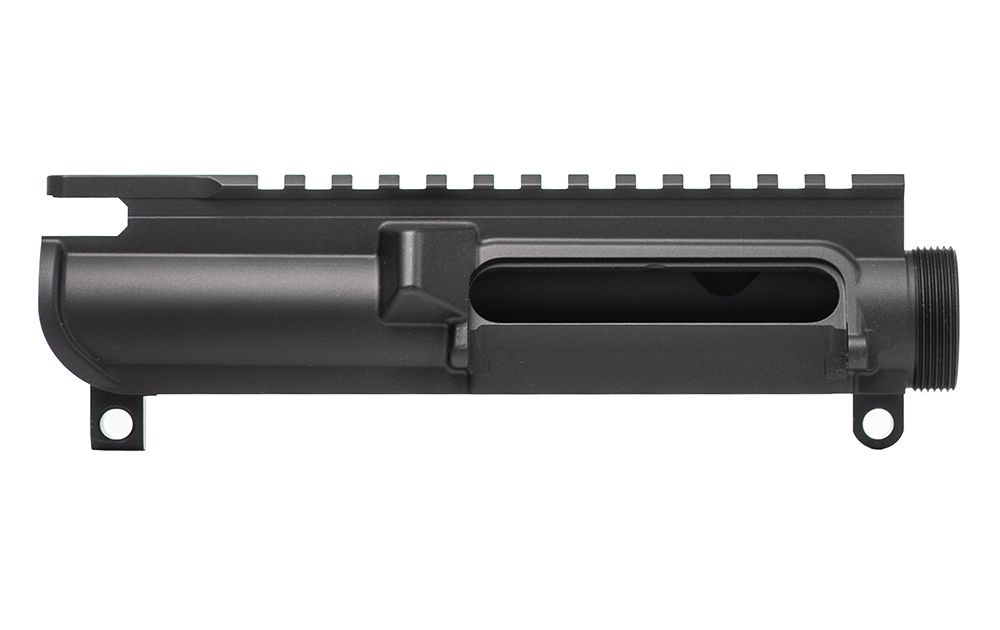
The Aero Precision AR-15 Stripped Upper Receiver is a forged upper receiver built out of lightweight yet durable 7075-T6 aluminum and finished with a black anodized coating for great surface wear and corrosion resistance.
This upper also comes with M4 feed ramps which pretty much eliminates the need for a forward assist. This setup is useful if you’re not going to be utilizing your rifle in a life-or-death situation or for an extended period of time.
Fortunately, the Aero Precision has been machined to mil-spec standards, which means that it is fully compatible with other mil-spec AR-15 components as well. In addition to the 6.8 SPC, it is also fully compatible with eight other AR-15 calibers. The Picatinny rail on the top of the upper also makes it very easy to mount optics. If you’re looking for a simple yet reliable upper, then consider this 6.8 SPC upper.
- Lightweight, durable construction
- Lifetime manufacturer warranty
- Compatible with many AR-15 cartridges
- Comes with Picatinny rails
- No forward assist
Bravo Company AR-15/ M4 Flattop Upper Receiver Assembly
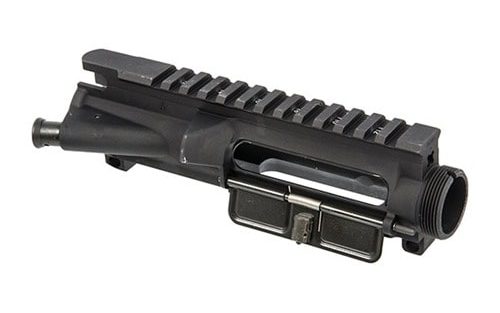
If you’re looking for one of the most reliable Upper receivers that money can buy, then the Bravo Company AR-15/ M4 Flat to Upper Receiver Assembly is the perfect choice for you. This lightweight, forged upper receiver is constructed from 7075 aluminum and finished with a Black anodized hard coat for excellent durability and corrosion resistance. The Bravo Company built this upper receiver to Mil-Spec standard for maximum compatibility with other aftermarket AR-15 parts.
T-Marks on the Picatinny rain guarantee that sights and other components are installed in their popper positions. Inside the upper receiver, you’ll find M4 feed ramps for improved feeding and smoother shooting cycles. This upper receiver is compatible with five different AR-15 cartridges including the 6.8 Remington SPC and the common 5.56 and .223 rounds.
The unique thing about this upper receiver is that it also comes with a forward assist as well as dust covers, two features that have been a hot debate in the AR-15 community for a while now as to whether or not they’re even useful.
Also, some barrels might be a little bit of a challenge to fit into the Bravo Company’s upper receiver. If you ever run into barrel fitting issues, try applying a little bit of heat to the upper receiver using a heat gun or hairdryer to expand the metal and properly fit the barrel into your receiver.
- Very durable and corrosion resistant
- Comes with M4 Feed ramps, forward assist, and dust covers
- Lifetime manufacturer’s warranty
- Compatible with five AR-15 calibers
Our Pick
The Bravo Company Flattop Upper Receiver is an obvious choice if you’re shopping for an American-made product with superior quality and performance. This flat-top upper receiver assembly from Bravo Company is a high-quality, locally made, mil-spec upper receiver that comes with a lifetime manufacturer’s guarantee.
As an added benefit, it comes pre-installed with a forward assist and a dust cover, should you choose to keep them. It’s a lightweight, reliable receiver that, with proper maintenance, is sure to last you a long time. Perfect for hunting large game outdoors with your 6.8 SPC or simply just taking it out to your favorite range and shooting lead.
How to Install the Best 6.8 SPC Uppers
Assembling a 6.8 upper receiver is very simple, and with the correct tools, you should be able to complete the entire process in as little as fifteen or twenty minutes, Just follow these steps:
- Secure your upper receiver in a vice.
- Place the barrel into the barrel opening. It should fit snugly.
- Make sure that the alignment notch on the barrel fits into the groove on the upper
- Thread on the barrel nut, and use a barrel nut tool to tighten it as much as you can. Make sure that the hole in the barrel nut aligns with the hole in the upper receiver so you can accommodate your gas tube.
- Slip the gas block tube through the hole in the barrel nut. Make sure that the block is aligned to the gas hole in the barrel.
- Secure the gas block to the barrel with screws, and consider using Loctite for added security.
- Fit the handguard over the barrel and thread it into the barrel nut.
- Tighten the tension nut to help hold it in place.
- Use a special AR tool for tightening up the handguard cap.
- Thread on the flash suppressor.
- Place the charging handle into the hole in the rear of the receiver where the bolt will go. Make sure that it is aligned, which it will be if it slides into place.
By following these steps, you can get your 6.8 upper receivers installed and ready to go for your AR-15.
Wrapping Up
Any one of the upper receivers that we have covered here today will be a solid choice for your 6.8 SPC AR-15 build. If you do decide to go a different route, you can follow the buyer’s guide section that we went over earlier to help you find a good upper receiver as well.
A few reminders before you go. When you buy a stripped upper receiver double-check compatibility within your AR-15 upper part kits, and especially with your AR-15 Lower receiver. Also, consider purchasing from one manufacturer since a lot of compatibility issues can be remedied by purchasing all your parts from one source.Â
Furthermore, consider preplanning your build ahead of time. Finding out early on the type and classification of the upper receiver to go with will influence the outcome, the durability, and the cost of your AR-15 build. A complete upper receiver will almost always be cheaper than putting together a stripper upper receiver with upper part kits.

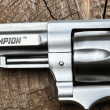
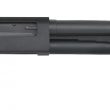

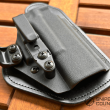
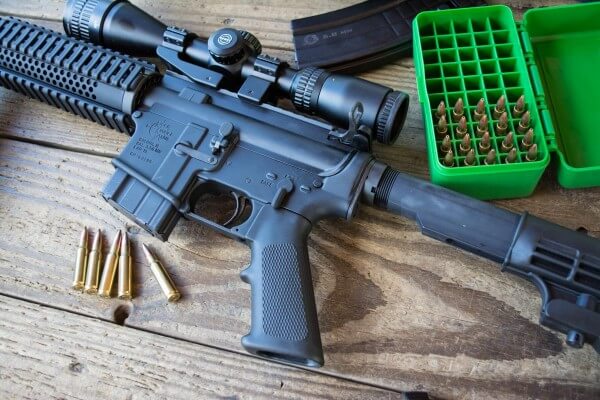

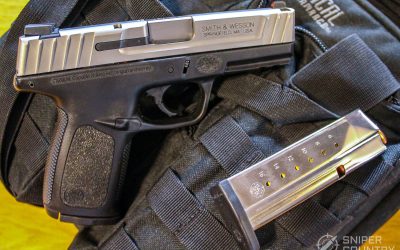

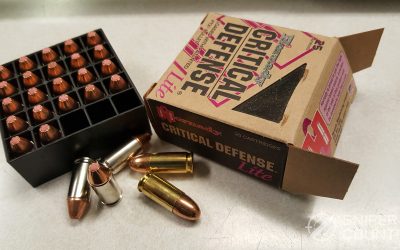
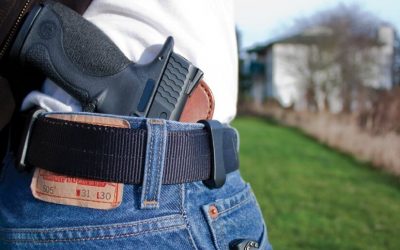
![9mm Glock Models [Ultimate Guide]](https://www.snipercountry.com/wp-content/uploads/2018/10/Glock-17-vs-Glock-19-vs-Glock-26-vs-Glock-41-vs-Glock-43-WM-400x250.jpg)
![Handgun Caliber Chart [2025 Ultimate Guide]](https://www.snipercountry.com/wp-content/uploads/2018/10/Handgun-Caliber-Comparison-400x250.jpg)
![Rifle Calibers [Ultimate Guide]](https://www.snipercountry.com/wp-content/uploads/2018/12/Header-1900-400x250.jpg)
